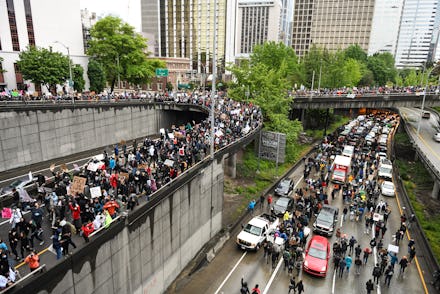Over 60 people have driven their cars into BLM protesters since May

At least 68 people have driven their cars into Black Lives Matter protesters since May 25. The incidents, most incited by civilians and some by police, represent an alarming trend in counter-protest violence against those marching in the streets. On foot, protesters are often defenseless against attacks by speeding vehicles; many have been injured and at least one person has died.
Data collected since late May by Ari Weil, deputy research director at the Chicago Project on Security and Threats of the University of Chicago, shows that vehicle assaults on protesters are increasingly common. According to NPR, Weil's research has found that 18 of the attacks were "deliberate," with many more still under investigation. Weil said that the motivation behind these acts is often animosity against the movement. "The message they're trying to send is, 'You need to get out of the street and stop these protests,'" Weil told NPR. "They're trying to intimidate the most recent wave of BLM protesters, to stop their movement."
Just this past weekend, a 24-year-old white protester was killed in Seattle after a car ran through a crowd of demonstrators on the highway. Another person who was struck is still in serious condition.
While many of the attacks involved KKK members and right-wing sympathizers, police perpetuated 5 of the 45 incidents Weil recorded. While the root cause of the violence is difficult to pin to a single source, anti-Black and anti-protester rhetoric online contributes.
"It is not just an extremist thing here, but there are social media circles online where people are sharing these and joking about them because they disagree with the protests and their methods," Weil told The New York Times.
In early June, a New York City police scanner actually broadcast messages advocating for running protesters over. In 2017, a Santa Fe police officer posted a meme on Facebook that said, "All lives splatter" and "nobody cares about your protest," and an officer in Oregon similarly posted to the social media site, saying, "When encountering such mobs remember, there are 3 pedals on your floor." Later that year, a man actually drove his car into a crowd with the intention to kill and maim protesters in Charlottesville, Virginia, murdering 32-year-old Heather Heyer.
Some legislators even seem to see it as their job to protect violent counter-protester's ability to turn their cars into weapons. "This is not just a handful of sociopaths living out a 4chan meme. Across the country, Republicans legislators have attempted to codify the idea that protesters surrender their rights when they stand in the road," Henry Grabar wrote for Slate in 2017. He notes that Republicans capitalize on discussions that politicize public space and question the rights of protesters. Right-wing white extremists also believe that public spaces like roads and highways need to be taken back, mirroring the "law and order" rhetoric favored by President Trump.
The seriousness with which these attacks are viewed, or if the right-wing protester's actions are seen as part of a broader trend of violence, is partially dependent on social circumstances and political context. Now, there's growing public intolerance for perpetrators of violence who slip through the criminal justice system, like police who kill with impunity or ram their cars through crowds of civilians. Some of the perpetrators of the attacks Weil studied are being prosecuted under hate crime laws, which many say is an important step in encouraging accountability for those responsible for racist violence at peaceful protests.